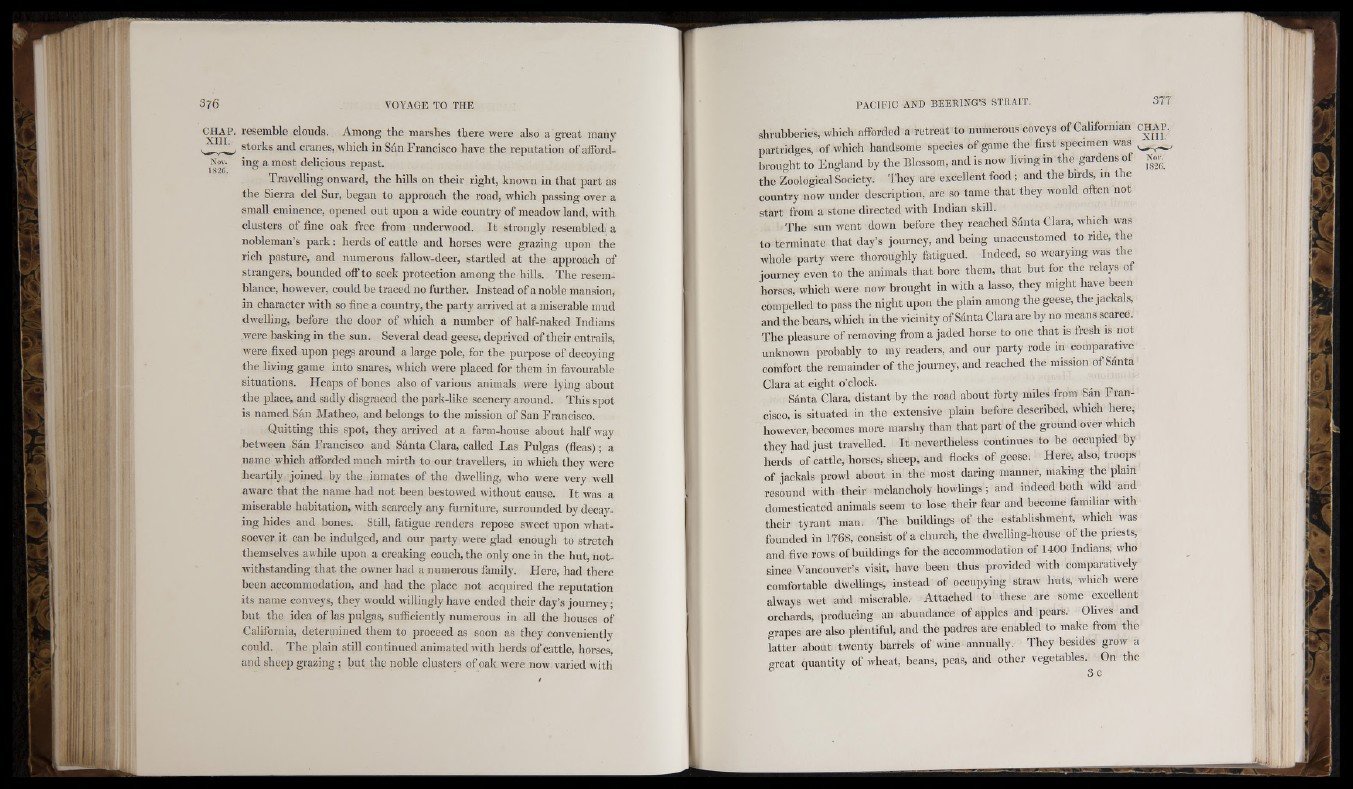
-W i
,1
Nov.
1826.
: i! ii
I i
|i
CH A P . resemble clouds. Among the marshes there were also a great many
’■ storks and cranes, which in Sán Francisco have the reputation of affording
a most delicious repast.
Travelling onward, the hills on their right, known in that part as
the Sierra del Sur, began to approach the road, which passing over a
small eminence, opened out upon a wide country of meadow land, with
clusters of fine oak free from underwood. It strongly resembled, a
nobleman’s park: herds of cattle and horses were grazing upon the
rich pasture, and numerous fiillow-deer, startled at the approach of
strangers, bounded off to seek protection among the hills. The resemblance,
however, could be traced no further. Instead of a noble mansion,
in character with so fine a country, the party arrived at a miserable mud
dwelling, before the door of which a number of half-naked Indians
were basking in the sun. Several dead geese, deprived of their entrails,
were fixed upon pegs around a large pole, for the purpose of decoying
the living game into snares, which were placed for them in favourable
situations. Heaps of bones also of various animals were lying about
the place, and sadly disgraced the park-like scenery around. This spot
is named Sán Matheo, and belongs to the mission of San Francisco.
Quitting this spot, they arrived at a farm-house about half way
between Sán Francisco and Sánta Clara, called Las Pulgas (fleas); a
name which afforded much mirth to our travellers, in which they were
heartily joined by the inmates of the dwelling, who were very well
aware that the name had not been bestowed without cause. It was a
miserable habitation, with scarcely any furniture, surrounded by decaying
hides and bones. Still, fatigue renders repose sweet upon whatsoever
it can be indulged, and our party were glad enough to stretch
themselves awhile upon a creaking couch, the only one in the hut, notwithstanding
that the owner had a numerous family. Here, had there
been accommodation, and had the place not acquired the reputation
its name conveys, they would willingly have ended their day’s journey;
but the idea of las pulgas, sufficiently numerous in all the houses of
California, determined them to proceed as soon as they conveniently
could. The plain still continued animated with herds of cattle, horses,
and sheep grazing ; but the noble clusters of oak were now varied with
, i r
shrubberies, which afforded a retreat to numerous coveys of Californian CHAR
partridges, of which handsome species of game the first specimen was
brought to England by the Blossom, and is now living in the gardens of Nov
the Zoological Society. They are excellent food ; and the birds, m the
country now under description, are so tame that they would often not
start from a stone directed with Indian skill.
The sun went down before they reached Sánta Clara, which was
to terminate that day’s journey, and being unaccustomed to ride, the
whole party were thoroughly fatigued. Indeed, so wearying was the
journey even to the animals that bore them, that but for the relays ot
horses, which were now brought in with a lasso, they might have been
compelled to pass the night upon the plain among the geese, the jackals,
and the bears, which in the vicinity of Sánta Clara are by no means scarce.
The pleasure of removing from a jaded horse to one that is fresh is not
unknown probably to my readers, and our party rode in comparative
comfort the remainder of the journey, and reached the mission of Sánta
Clara at eight o’clock.
Sánta Clara, distant by the road about forty miles from San !• rancisco,
is situated in the extensive plain before described, which here,
howCTer, becomes more marshy than that part of the ground over which
they had just travelled. It nevertheless continues to be occupied by
herds of cattle, horses, sheep, and flocks of geese. Here, also, troops
of jackals prowl about in the most daring manner, making the plain
resound with their melancholy howlings; and indeed both wild and
domesticated animals seem to lose their fear and become familiar with
their tyrant man. The buildings of the establishment, which was
founded in 1768, consist of a church, the dwelling-house of the priests,
and five rows of buildings for the accommodation of 1400 Indians, who
since Vancouver’s visit, have been tlms provided with comparatively
comfortable dwellings, instead of occupying straw huts, which were
always wet and miserable. Attached to these are some excellent
orchards, producing an abundance of apples and pears. Olives and
grapes are also plentiful, and the padres are enabled to make from the
hitter about twenty barrels of wine annually. They besides grow a
great quantity of wheat, beans, peas, and other vegetables. On the
Í